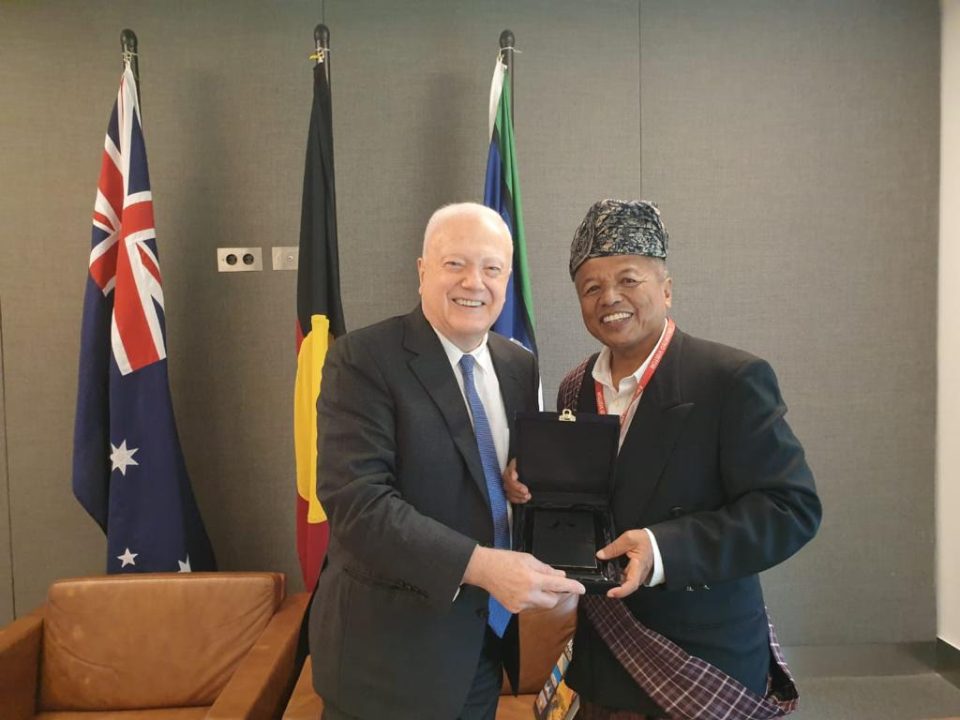Global collaboration and interaction no longer trade upon the power of government.
Rather it shifts to people-to-people contact that goes beyond national boundaries. While the former refers to the interaction between the normal citizens of two countries at various levels without any official interference and guidance, the latter should follow equivalent jurisdiction and authority for multiple areas of governance. Moreover, people-to-people contact exerts a tremendous impact on the sustainable relationship of those involved due to its cultural aspects.
Gusrizal, an Indonesian language teacher for non-native speakers based in Bukittinggi, West Sumatra, is a key pioneer in people-to-people contact between Indonesia and Australia. Born in Bukittinggi on 6th August 1962, he has been working for over fifteen years to build good cooperation between the two countries regarding education and culture. “I will never be stalled and fed up with bridging Indonesia and Australia relations. In fact, many have been done voluntarily,” he said vigorously.
In 2015, for example, Mornington Secondary College, Victoria, hosted Gusrizal where he taught a range of students from primary schools and secondary colleges along the Mornington Peninsula. During these classes, he was able to give authentic language lessons and discuss cultural elements of Indonesia which in turn gave students a detailed insight into how Indonesia and the language work. In addition, he also provided students with an opportunity to Skype with a school in Bukittinggi which was an incredible experience for both teachers and students involved.
During his visit to Australia for two weeks in 2016, Gusrizal teamed up with Languages Other Than English (LOTE) teachers, preparing for various activities, which included visiting several schools in Queensland to provide impetus and encouragement to LOTE teachers and their students. “There is an appealing program for students called ‘Indonesian Day’. I am happy to share with the students,” he referred to the program.
Visiting some schools in Queensland, he met LOTE teachers and shared his experience with teaching Bahasa Indonesia. “Mutual understanding between people of different cultures can only begin through direct contact, and language and culture classes at schools are the best places for students to start. This is my way of bridging the gap between people,” he explained.
Furthermore, owing to his good rapport with Tim Lindsey, the Chair of the Australia Indonesia Institute, Gusrizal delivered a public lecture at the Asia Institute, a School of the Faculty of Arts at The University of Melbourne in July 2016. He has explored the importance of Australia-Indonesia relations through cultural diplomacy focusing on people-to-people contact.
As a former expert staff in international affairs of the Bukittinggi Mayor, he explored every avenue to invite Australian teachers and students to the city as a part of exchange programs for students and teachers. He established Element for Indonesia—an education, culture, research and development NGO headquartered in the city.
Gusrizal’s commitment to promoting Indonesian culture enjoys reciprocal responses from his friends in the Down Under country. In 2018, Gusrizal received a visit from his Australian friend Daniel Bradbury in an attempt to promote Bukittinggi city and Agam regency through the Indonesian language for Australians. During the visit, Gusrizal gave them a favour to have a close look at various potentials of Bukittinggi and Agam regency.
They intended to film the beauty of Minangkabau culture and nature, which in turn assisted Australian students to get to know and better understand their beauty. Short films and books on Indonesian cultural and linguistic aspects are necessary resources used by language teachers across Australia to support the Indonesian teaching program.
He even received recognition from the Australian government; Australia’s Ambassador to Indonesia, Gary Quinlan, invited him to Jakarta in 2018 and credited him for his great contribution to constructive relations between the two countries.
In April 2018, he was a delegate at the 4th Indonesia-Australia Dialogue organised by the Australian Institute of International Affairs with the support of the Department of Foreign Affairs and Trade and the Indonesian Ministry of Foreign Affairs.
In spite of the ups and downs of Australia and Indonesia’s relation, Gusrizal reckons that people-to-people contact between the two countries should not go interrupted since a great number of teachers are promoting Indonesia through Indonesian language teaching at all levels of education, ranging from elementary, high school and colleges. Students study the Indonesian language, which is on the list of the five top foreign languages taught in the country. “Indonesian language teaching in Australia is the largest in the world,” he reminded. To him, grasping the big picture and seeing the puzzle in its entirety is of much significance. He is assured that the two countries’ current dynamics of the political scene should not victimise something more valuable in store.
Gusrizal is committed to continuing his work, with or without any financial aid, and expects that someday the two governments can sit together and settle their differences. “Getting preoccupied with alternating between Indonesia and Australia to teach the Indonesian language in various elementary and junior high schools is my way of contributing to my homeland,” he ended the interview.




